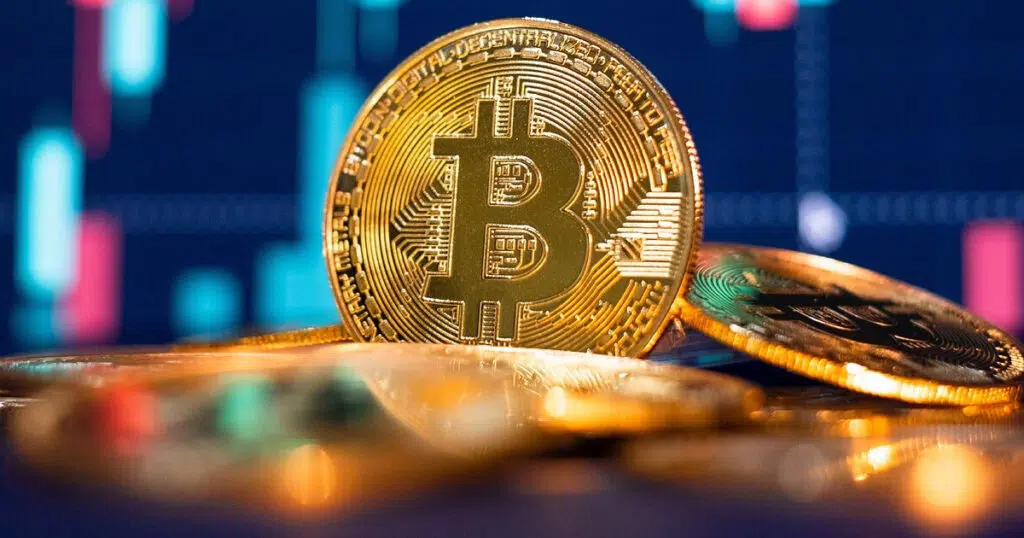
An Introduction to Bitcoin and Cryptocurrency
Cryptocurrencies have really taken off in the last decade, with rises and falls in value that make a roller coaster look like a drive with Miss Daisy. Some people swear by them, and others swear them off. So what are they?
Bitcoin (BTC) is the first of many, many different kinds of cryptocurrency. Similar to how fiat currencies have numerous varieties from the United States Dollar (US$), Euro, British pound, and beyond, cryptocurrencies come in a large array of options. Ethereum is a popular one, along with Dogecoin which made a splash last year. These currencies are completely digital, with no physical form to hold and trade without technology like a smartphone, computer, or digital wallet. Essentially, they are codes that represent value held.
Why do they exist?
Bitcoin is considered the first cryptocurrency, as it made its debut in 2009 by an anonymous individual or group that called itself Satoshi Yakamoto. The reason for this creation, and the reason these currencies are revered (and despised) by people all over the world, is that they aim to solve two problematic components of traditional banking: trust and centralization.
Trust
With a traditional financial institution you have a ledger, and this ledger keeps track of all of the transactions. Whether it was a paper ledger with hand written deposits and withdrawals recorded in a book, or a computer program ledger that automatically records and remembers all transactions for thousands of people at once, something, or someone, is keeping track. This involves trust, of course, as it is possible for someone with the knowhow to alter the ledger and change it to reflect whatever their nefarious needs desire. A trust-based system can be opened back up and altered after a transaction has taken place, or without an honest transaction taking place at all. Even without dishonesty, mistakes can be made.
Another common problem with digital currencies is the issue of double spending. If Ann has a digital code representing $100, she could have sent that code to two different people and both could redeem the code, devaluing the currency and diminishing trust.
Cryptocurrencies like Bitcon are trustless systems because their ledger is built on a blockchain.
Imagine, if you will, shingles going down on a roof, or wood slats on a floor. The second one fits over or onto the first, the third over or onto the second, and on and on. You cannot remove the second one after the third one has been placed without taking up everything placed after it. The preceding shingles are immutable the instant they have been advanced on.
This is like a blockchain, but instead of shingles we have electronic blocks of cryptographic code that verify a transaction took place. This verification is done by miners. The miners have computer software and hardware that can ensure that the transactions being made are legitimate, and when they solve the puzzle that accomplishes this a block is added to the chain that cannot be altered after the next block is set. Once the miner solidifies the block into the chain, their efforts are rewarded by a payment of Bitcoin. In the case of double spend, the miners prioritize one of the transactions over the other, nullifying the second one. This makes the ledger legitimized and permanent, removing the need for trust. Without the need for trust we eliminate the interference of third parties. This brings us to our second point.
Centralization
When something is centralized, it means that a system is managed in one place. If something is decentralized, anyone can do business with anyone without having to go through a third party to facilitate or approve the transaction.
For example, if there is only one hardware store in town, everyone has to go to that central location to get their supplies. If the store is closed, out of stock, or refuses to do business with people that are in debt to the IRS, that creates a problem for some. If this was the only way people could get supplies, this would be a centralized marketplace.
However, people can operate outside the hardware store and trade with each other, making that a decentralized marketplace. If someone was excluded from the hardware store they could hang out in the parking lot and wait for someone that was willing to go in for them and buy them a hammer, or they could go ask their neighbor if they had an extra hammer to sell. The concept is similar when it comes to our money.
Our mainstream financial system is centralized. If you want to use your US dollars to buy that hammer you are going through a central point to access it. Your bank is holding your money, most likely, so you are going to have to use the bank to send your money to the vendor. When the vendor confirms that the bank sent the money, you can take your purchase. The bank’s participation is essential in your transaction.
So what if you use cash? Isn’t that decentralized?
No, it isn’t. Sure you could take all your money out of the banks and keep it in paper cash under your mattress, but a single government could still deflate the value of that asset by creating more of it out of thin air (inflation), or by deciding that you can no longer use cash. Many countries are either banning paper cash, or coercing their citizens to ditch the cash and go digital. The fact that some other entity has to allow for your use of the currency means that it is centralized, and not independent of restrictions or boundaries. The cash itself is not a free agent, its value and participation relies on a centralized entity.
Bitcoin, however, is decentralized. The ledger history is available to anyone, not a central party, and is solidified with blockchain. When you engage in a transaction with someone else using BTC there is no third party approving it, it is 100% between the two parties. If you have the funds, you can send them, no questions asked, no one to get in your way. Some claim that this is why Bitcoin has been so demonized by mainstream financial advisors across the globe – it represents freedom from their current systems, and from their future plans for manipulatable, digital government currency.
Another important point for an introduction to BTC is the fact that it is by design not an infinite currency, like a president of the federal reserved claimed in 2020 US$ was. In about a hundred years it is estimated that the entirety of the 21 million bitcoins will be in circulation, and that’s it. No more.
This finite number offers BTC a disinflationary or deflationary value, depending on who you ask. Since the Federal Reserve can print US$ all day long to send to Ukraine, the value of our nation’s money is questionable. With BTC there is a bit of certainty that, like gold, it by definition cannot be completely arbitrarily manipulated or inflated to worthlessness, offering comfort and appeal to many.
Frequently Asked Questions
Can’t Bitcoin just be shut down?
Good question, and not really. The Bitcoin network is supported by people in dozens of countries all over the world with its decentralized ledger. Unlike your bank, or your nation’s currency, no one entity can decide it is banned. Even if in your country’s Orwellian future the government bans the internet or monitors people’s online activity to block unapproved movement, as long as there is some open internet to connect to elsewhere in the world, a Bitcoin network will likely be operating and you can use your funds. If you are concerned about losing your crypto in a global internet or power outage, it will be alongside many, many other major financial concerns. This is why portfolio diversification is important with not only digital currencies like BTC and your US$ in the bank, but in tangible currencies like cash, gold, silver, ammo, etc.
Don’t people get their cryptocurrencies stolen?
Yes, people do get robbed of their crypto. Just like keeping your money in your wallet, someone can steal it. The trustless system refers more to the network, rather than an individual’s personal coins as property. If your crypto isn’t kept in a secure place, like an entirely offline wallet, you could be susceptible to theft. There are many steps to take to prevent theft that the average crypto holder ignores. Also, it is important to note that your transactions are NOT private. There are a few coins out there that make complete discretion their mission, but cryptocurrency business in general is not out of the view of others. It may take a few extra steps for the IRS to find the record of your BTC, but it is there.
Isn’t it just a Ponzi scheme?
The value of the currency comes through supply and demand, much like other currencies, and this supply and demand comes from media attention, cost of production, government regulation, and number of competitors. Unlike a real Ponzi scheme scam, where the new investors are used to pay the old ones, Bitcoin is considered more like a commodity, a store of value. While it is true that BTC holders would benefit from promoting more people to buy in, and it is considered a high risk investment by some, it does not meet the definition of a scam.
In Summary
What are the pros to cryptocurrency, BTC specifically? No third party can interfere with your transaction as you are free to do business with whoever you want, it cannot be shut down by a single entity like a government or bank, and the finite nature offers more of a commodity appeal as a store of value.
Whether you appreciate more unregulated transactions, a bit of investment excitement, combatting the new world order’s aim of a global, controlled currency, operating outside of the fiat, or prefer putting your money in a place that offers the unique potential for a long term store of value, Bitcoin has several good reasons to be considered in your portfolio.



